摘要:在Castle IOC容器实践之Startable Facility(一)中我们已经学会了如何去使用Startable Facility,本文将在此基础进一步对它的原理做一些分析。
主要内容
Startable Facility原理分析
……
在Castle IOC容器实践之Startable Facility(一)中我们已经看到了如何去使用Startable Facility,本文将对它的原理做一些分析。先看一下接口IStartable,它的实现代码如下:
 public
interface
IStartable
public
interface
IStartable

 {
{ void Start();
void Start();
 void Stop();
void Stop(); }
}
代码是相当的简单,只有两个方法,分别在组件创建的时候和销毁的时候执行,这就涉及到了组件的生命周期管理。在Windsor中,接口ILifecycleConcern提供特定的组件生命周期管理:
 public
interface
ILifecycleConcern
public
interface
ILifecycleConcern

 {
{ void Apply( ComponentModel model, object component );
void Apply( ComponentModel model, object component );
 }
}
现在我们要实现组件的自动创建和销毁,就需要实现接口ILifecycleConcern,在Startable Facility中分别用两个类来实现,第一个类StartConcern,它判断如果组件实现了接口IStartable,则直接调用它的Start()方法;如果组件是用特性startMethod,则获取并调用具有startMethod特性的方法:
 public
class
StartConcern : ILifecycleConcern
public
class
StartConcern : ILifecycleConcern

 {
{ private static readonly StartConcern _instance = new StartConcern();
private static readonly StartConcern _instance = new StartConcern();
 protected StartConcern()
protected StartConcern()

 {
{
 }
}
 public static StartConcern Instance
public static StartConcern Instance

 {
{
 get
get  { return _instance; }
{ return _instance; } }
}
 public void Apply(ComponentModel model, object component)
public void Apply(ComponentModel model, object component)

 {
{ if (component is IStartable)
if (component is IStartable)

 {
{ (component as IStartable).Start();
(component as IStartable).Start(); }
} else if (model.Configuration != null)
else if (model.Configuration != null)

 {
{ String startMethod = model.Configuration.Attributes["startMethod"];
String startMethod = model.Configuration.Attributes["startMethod"];
 if (startMethod != null)
if (startMethod != null)

 {
{
 MethodInfo method = model.Implementation.GetMethod(startMethod);
MethodInfo method = model.Implementation.GetMethod(startMethod);
 method.Invoke(component, null);
method.Invoke(component, null); }
} }
} }
} }
}
第二个类是StopConcern,它判断如果组件实现了接口IStartable,则直接调用它的Stop()方法;如果组件是用特性stopMethod,则获取并调用具有stopMethod特性的方法:
 public
class
StopConcern : ILifecycleConcern
public
class
StopConcern : ILifecycleConcern

 {
{ private static readonly StopConcern _instance = new StopConcern();
private static readonly StopConcern _instance = new StopConcern();
 protected StopConcern()
protected StopConcern()

 {
{
 }
}
 public static StopConcern Instance
public static StopConcern Instance

 {
{
 get
get  { return _instance; }
{ return _instance; } }
}
 public void Apply(ComponentModel model, object component)
public void Apply(ComponentModel model, object component)

 {
{ if(component is IStartable)
if(component is IStartable)

 {
{ (component as IStartable).Stop();
(component as IStartable).Stop(); }
} else if (model.Configuration != null)
else if (model.Configuration != null)

 {
{ String stopMethod = model.Configuration.Attributes["stopMethod"];
String stopMethod = model.Configuration.Attributes["stopMethod"];
 if (stopMethod != null)
if (stopMethod != null)

 {
{ MethodInfo method = model.Implementation.GetMethod(stopMethod);
MethodInfo method = model.Implementation.GetMethod(stopMethod);
 method.Invoke(component, null);
method.Invoke(component, null); }
} }
} }
} }
}
好了,知道了Startable Facility如何管理组件的生命周期,我们就来看看真正的Startable Facility是如何实现的。每一个Facility都是满足这样的一个继承关系:

图1 Facility继承关系图
其中的Abstract Facility提供了一些默认的实现,Facility可以直接实现IFacility,也可以继承于Abstract Facility。IFacility的实现如下:
 public
interface
IFacility
public
interface
IFacility

 {
{ void Init(IKernel kernel, IConfiguration facilityConfig);
void Init(IKernel kernel, IConfiguration facilityConfig);

 void Terminate();
void Terminate();
 }
}
那么到底如何让组件满足依赖性后就自动执行呢?注意到再Startable Facility的Init()注册了这样的两个事件:
 protected
override
void
Init()
protected
override
void
Init()

 {
{ converter = (ITypeConverter) Kernel.GetSubSystem(SubSystemConstants.ConversionManagerKey);
converter = (ITypeConverter) Kernel.GetSubSystem(SubSystemConstants.ConversionManagerKey);

 Kernel.ComponentModelCreated +=
Kernel.ComponentModelCreated += 
 new ComponentModelDelegate(OnComponentModelCreated);
new ComponentModelDelegate(OnComponentModelCreated);
 Kernel.ComponentRegistered +=
Kernel.ComponentRegistered += 
 new ComponentDataDelegate(OnComponentRegistered);
new ComponentDataDelegate(OnComponentRegistered);
 }
}
分别为OnComponentModelCreated和OnComponentRegistered。当我们注册一个组件时首先会出发OnComponentRegistered事件,在它里面判断组件是否满足依赖性,如果不满足,则添加到一个等待列表中,否则就直接启动,然后再对这个等待列表进行检测,看添加改组件后,列表中是否有组件满足了依赖性:
 private
void
OnComponentRegistered(String key, IHandler handler)
private
void
OnComponentRegistered(String key, IHandler handler)

 {
{ bool startable = (bool) handler.ComponentModel.ExtendedProperties["startable"];
bool startable = (bool) handler.ComponentModel.ExtendedProperties["startable"];
 if (startable)
if (startable)

 {
{ if (handler.CurrentState == HandlerState.WaitingDependency)
if (handler.CurrentState == HandlerState.WaitingDependency)

 {
{ waitList.Add( handler );
waitList.Add( handler ); }
} else
else

 {
{ Start( key );
Start( key ); }
} }
}
 CheckWaitingList();
CheckWaitingList(); }
}

 private
void
CheckWaitingList()
private
void
CheckWaitingList()

 {
{ IHandler[] handlers = (IHandler[]) waitList.ToArray( typeof(IHandler) );
IHandler[] handlers = (IHandler[]) waitList.ToArray( typeof(IHandler) );
 IList validList = new ArrayList();
IList validList = new ArrayList();
 foreach(IHandler handler in handlers)
foreach(IHandler handler in handlers)

 {
{ if (handler.CurrentState == HandlerState.Valid)
if (handler.CurrentState == HandlerState.Valid)

 {
{ validList.Add(handler);
validList.Add(handler);
 waitList.Remove(handler);
waitList.Remove(handler); }
} }
}
 foreach(IHandler handler in validList)
foreach(IHandler handler in validList)

 {
{ Start( handler.ComponentModel.Name );
Start( handler.ComponentModel.Name ); }
} }
}
刚才说到,如果满足了依赖性,则会请求创建这个组件:
 private
void
Start(String key)
private
void
Start(String key)

 {
{ object instance = Kernel[key];
object instance = Kernel[key]; }
}
这时就触发了OnComponentModelCreated事件,这时就该用到开始我们所讲的那两生命周期处理的类了:
 private
void
OnComponentModelCreated(ComponentModel model)
private
void
OnComponentModelCreated(ComponentModel model)

 {
{ bool startable =
bool startable = 
 CheckIfComponentImplementsIStartable(model) || HasStartableAttributeSet(model);
CheckIfComponentImplementsIStartable(model) || HasStartableAttributeSet(model);
 model.ExtendedProperties["startable"] = startable;
model.ExtendedProperties["startable"] = startable;
 if (startable)
if (startable)

 {
{ model.LifecycleSteps.Add(
model.LifecycleSteps.Add( 
 LifecycleStepType.Commission, StartConcern.Instance );
LifecycleStepType.Commission, StartConcern.Instance );
 model.LifecycleSteps.Add(
model.LifecycleSteps.Add( 
 LifecycleStepType.Decommission, StopConcern.Instance );
LifecycleStepType.Decommission, StopConcern.Instance );
 }
} }
}
首先还是先判断组件是否实现了IStartable接口或这时候有特性startable,如果没有那也就不用自动启动了,否则就把StartConcern和StopConcern分别注册为组件的生命周期开始行为和生命周期结束行为,(关于组件的生命周期的详细内容可以参考我前面写的Castle IOC容器组件生命周期管理)。此时组件进入生命周期开始,会调用StartConcern的Apply()方法,这时就触发组件的Start()方法,同样在组件销毁时调用StopConcern的Apply()方法,这时就会调用组件的Stop()方法。这样就完成整个了组件的自动执行与销毁的全过程。





















 324
324











 被折叠的 条评论
为什么被折叠?
被折叠的 条评论
为什么被折叠?








